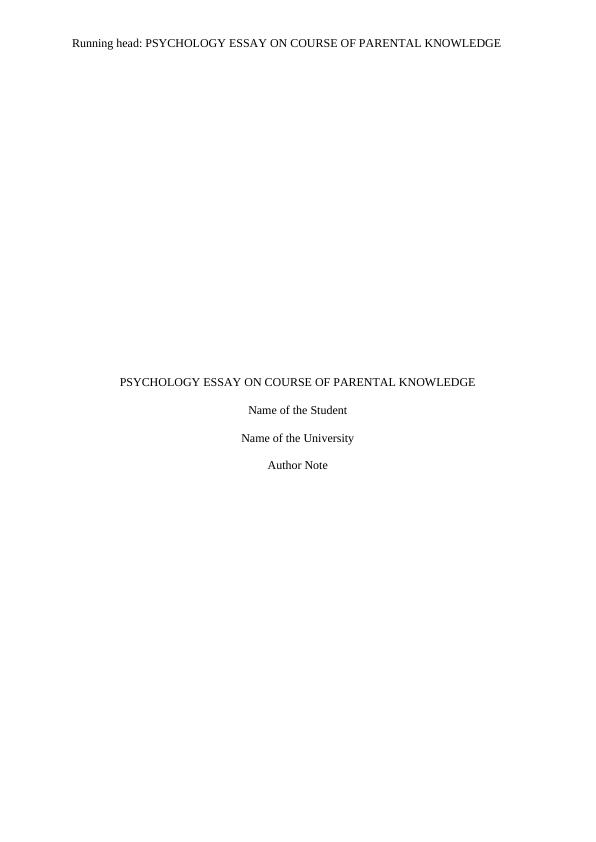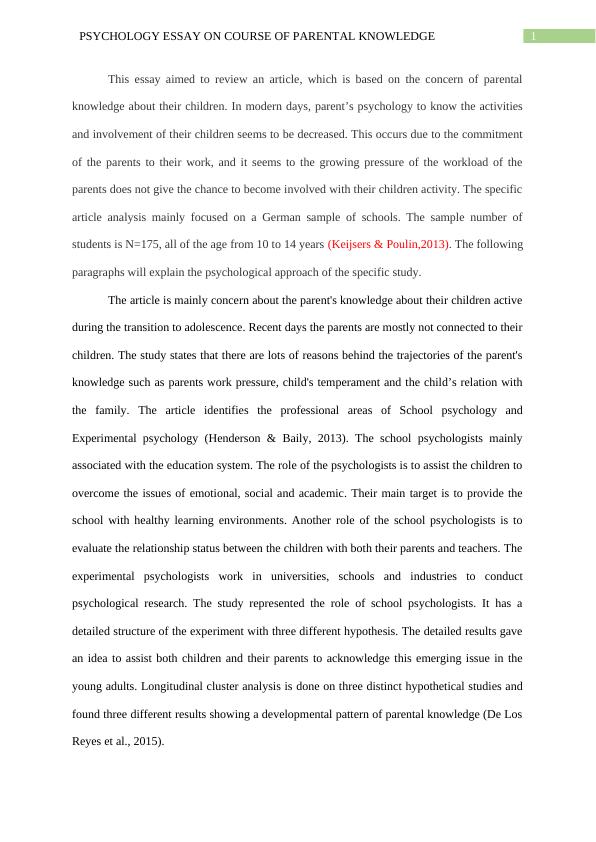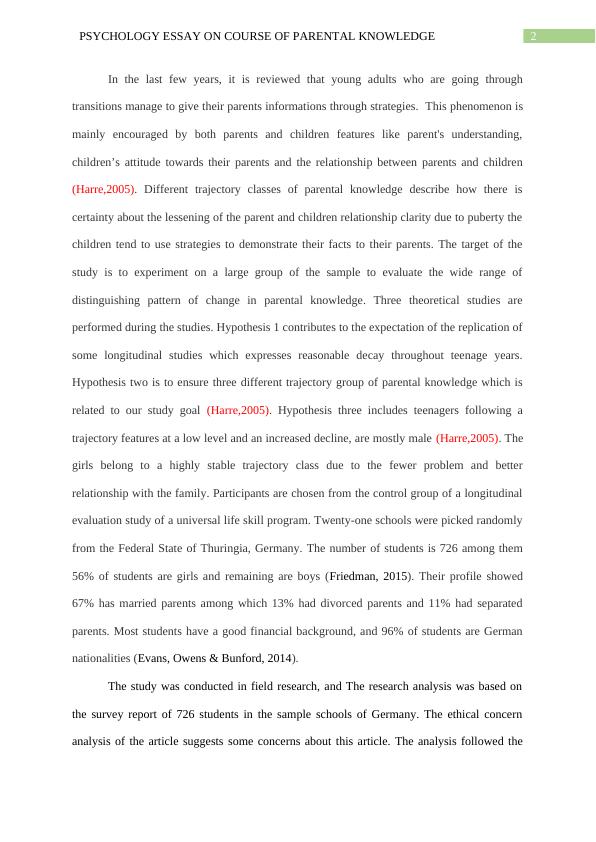Psychology Essay on Course of Parental Knowledge
Added on 2023-06-10
6 Pages1658 Words161 Views
Running head: PSYCHOLOGY ESSAY ON COURSE OF PARENTAL KNOWLEDGE
PSYCHOLOGY ESSAY ON COURSE OF PARENTAL KNOWLEDGE
Name of the Student
Name of the University
Author Note
PSYCHOLOGY ESSAY ON COURSE OF PARENTAL KNOWLEDGE
Name of the Student
Name of the University
Author Note

1PSYCHOLOGY ESSAY ON COURSE OF PARENTAL KNOWLEDGE
This essay aimed to review an article, which is based on the concern of parental
knowledge about their children. In modern days, parent’s psychology to know the activities
and involvement of their children seems to be decreased. This occurs due to the commitment
of the parents to their work, and it seems to the growing pressure of the workload of the
parents does not give the chance to become involved with their children activity. The specific
article analysis mainly focused on a German sample of schools. The sample number of
students is N=175, all of the age from 10 to 14 years (Keijsers & Poulin,2013). The following
paragraphs will explain the psychological approach of the specific study.
The article is mainly concern about the parent's knowledge about their children active
during the transition to adolescence. Recent days the parents are mostly not connected to their
children. The study states that there are lots of reasons behind the trajectories of the parent's
knowledge such as parents work pressure, child's temperament and the child’s relation with
the family. The article identifies the professional areas of School psychology and
Experimental psychology (Henderson & Baily, 2013). The school psychologists mainly
associated with the education system. The role of the psychologists is to assist the children to
overcome the issues of emotional, social and academic. Their main target is to provide the
school with healthy learning environments. Another role of the school psychologists is to
evaluate the relationship status between the children with both their parents and teachers. The
experimental psychologists work in universities, schools and industries to conduct
psychological research. The study represented the role of school psychologists. It has a
detailed structure of the experiment with three different hypothesis. The detailed results gave
an idea to assist both children and their parents to acknowledge this emerging issue in the
young adults. Longitudinal cluster analysis is done on three distinct hypothetical studies and
found three different results showing a developmental pattern of parental knowledge (De Los
Reyes et al., 2015).
This essay aimed to review an article, which is based on the concern of parental
knowledge about their children. In modern days, parent’s psychology to know the activities
and involvement of their children seems to be decreased. This occurs due to the commitment
of the parents to their work, and it seems to the growing pressure of the workload of the
parents does not give the chance to become involved with their children activity. The specific
article analysis mainly focused on a German sample of schools. The sample number of
students is N=175, all of the age from 10 to 14 years (Keijsers & Poulin,2013). The following
paragraphs will explain the psychological approach of the specific study.
The article is mainly concern about the parent's knowledge about their children active
during the transition to adolescence. Recent days the parents are mostly not connected to their
children. The study states that there are lots of reasons behind the trajectories of the parent's
knowledge such as parents work pressure, child's temperament and the child’s relation with
the family. The article identifies the professional areas of School psychology and
Experimental psychology (Henderson & Baily, 2013). The school psychologists mainly
associated with the education system. The role of the psychologists is to assist the children to
overcome the issues of emotional, social and academic. Their main target is to provide the
school with healthy learning environments. Another role of the school psychologists is to
evaluate the relationship status between the children with both their parents and teachers. The
experimental psychologists work in universities, schools and industries to conduct
psychological research. The study represented the role of school psychologists. It has a
detailed structure of the experiment with three different hypothesis. The detailed results gave
an idea to assist both children and their parents to acknowledge this emerging issue in the
young adults. Longitudinal cluster analysis is done on three distinct hypothetical studies and
found three different results showing a developmental pattern of parental knowledge (De Los
Reyes et al., 2015).

2PSYCHOLOGY ESSAY ON COURSE OF PARENTAL KNOWLEDGE
In the last few years, it is reviewed that young adults who are going through
transitions manage to give their parents informations through strategies. This phenomenon is
mainly encouraged by both parents and children features like parent's understanding,
children’s attitude towards their parents and the relationship between parents and children
(Harre,2005). Different trajectory classes of parental knowledge describe how there is
certainty about the lessening of the parent and children relationship clarity due to puberty the
children tend to use strategies to demonstrate their facts to their parents. The target of the
study is to experiment on a large group of the sample to evaluate the wide range of
distinguishing pattern of change in parental knowledge. Three theoretical studies are
performed during the studies. Hypothesis 1 contributes to the expectation of the replication of
some longitudinal studies which expresses reasonable decay throughout teenage years.
Hypothesis two is to ensure three different trajectory group of parental knowledge which is
related to our study goal (Harre,2005). Hypothesis three includes teenagers following a
trajectory features at a low level and an increased decline, are mostly male (Harre,2005). The
girls belong to a highly stable trajectory class due to the fewer problem and better
relationship with the family. Participants are chosen from the control group of a longitudinal
evaluation study of a universal life skill program. Twenty-one schools were picked randomly
from the Federal State of Thuringia, Germany. The number of students is 726 among them
56% of students are girls and remaining are boys (Friedman, 2015). Their profile showed
67% has married parents among which 13% had divorced parents and 11% had separated
parents. Most students have a good financial background, and 96% of students are German
nationalities (Evans, Owens & Bunford, 2014).
The study was conducted in field research, and The research analysis was based on
the survey report of 726 students in the sample schools of Germany. The ethical concern
analysis of the article suggests some concerns about this article. The analysis followed the
In the last few years, it is reviewed that young adults who are going through
transitions manage to give their parents informations through strategies. This phenomenon is
mainly encouraged by both parents and children features like parent's understanding,
children’s attitude towards their parents and the relationship between parents and children
(Harre,2005). Different trajectory classes of parental knowledge describe how there is
certainty about the lessening of the parent and children relationship clarity due to puberty the
children tend to use strategies to demonstrate their facts to their parents. The target of the
study is to experiment on a large group of the sample to evaluate the wide range of
distinguishing pattern of change in parental knowledge. Three theoretical studies are
performed during the studies. Hypothesis 1 contributes to the expectation of the replication of
some longitudinal studies which expresses reasonable decay throughout teenage years.
Hypothesis two is to ensure three different trajectory group of parental knowledge which is
related to our study goal (Harre,2005). Hypothesis three includes teenagers following a
trajectory features at a low level and an increased decline, are mostly male (Harre,2005). The
girls belong to a highly stable trajectory class due to the fewer problem and better
relationship with the family. Participants are chosen from the control group of a longitudinal
evaluation study of a universal life skill program. Twenty-one schools were picked randomly
from the Federal State of Thuringia, Germany. The number of students is 726 among them
56% of students are girls and remaining are boys (Friedman, 2015). Their profile showed
67% has married parents among which 13% had divorced parents and 11% had separated
parents. Most students have a good financial background, and 96% of students are German
nationalities (Evans, Owens & Bunford, 2014).
The study was conducted in field research, and The research analysis was based on
the survey report of 726 students in the sample schools of Germany. The ethical concern
analysis of the article suggests some concerns about this article. The analysis followed the

End of preview
Want to access all the pages? Upload your documents or become a member.
Related Documents
PSCY2019 Social Psychology Assignmentlg...
|8
|1991
|130
Human Relationships and Life Transitions: Understanding Psychosocial Development in Early Childhoodlg...
|6
|1746
|59
Classroom Interactions, Dyadic Teacher-Child Relationships, and Self-Regulation in Socially Disadvantaged Young Childrenlg...
|4
|1747
|297
The Impact of Parenting Style on a Child's Attitude in Schoollg...
|10
|1617
|480
Coping and Psychological Health of Aging Parents of Adult Children With Developmental Disabilities | Article Reviewlg...
|6
|842
|25
Factors Influencing Childhood Developmentlg...
|10
|2356
|488